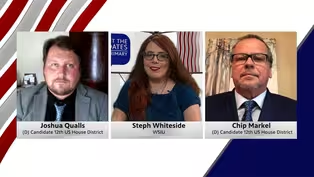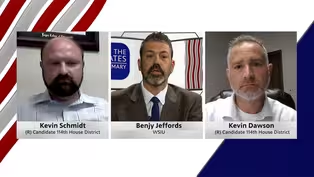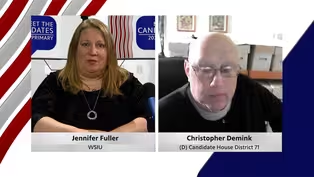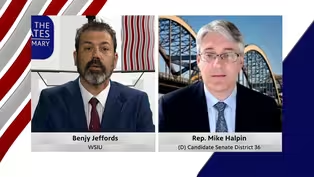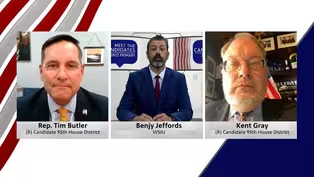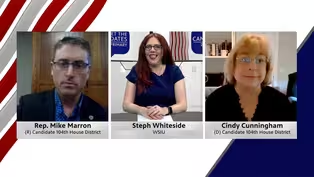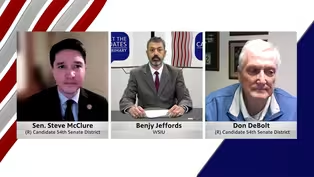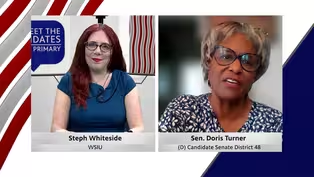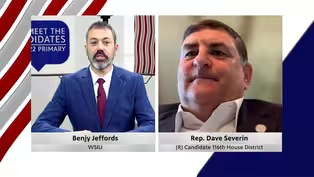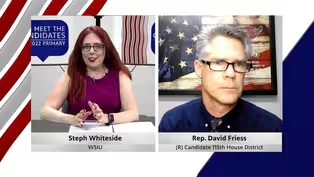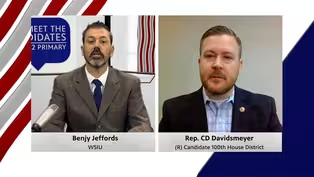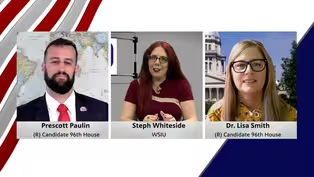Meet the Candidates
59th Illinois Senate District Primary Republican Candidate
4/28/2022 | 27m 29sVideo has Closed Captions
WSIU interviews Senator Dale Fowler from the 59th Senate District.
On this episode of Meet the Candidates, WSIU interviews Senator Dale Fowler from the 59th Senate District.
Problems playing video? | Closed Captioning Feedback
Problems playing video? | Closed Captioning Feedback
Meet the Candidates is a local public television program presented by WSIU
This series is produced in partnership with the League of Women Voters
Meet the Candidates
59th Illinois Senate District Primary Republican Candidate
4/28/2022 | 27m 29sVideo has Closed Captions
On this episode of Meet the Candidates, WSIU interviews Senator Dale Fowler from the 59th Senate District.
Problems playing video? | Closed Captioning Feedback
How to Watch Meet the Candidates
Meet the Candidates is available to stream on pbs.org and the free PBS App, available on iPhone, Apple TV, Android TV, Android smartphones, Amazon Fire TV, Amazon Fire Tablet, Roku, Samsung Smart TV, and Vizio.
Providing Support for PBS.org
Learn Moreabout PBS online sponsorshipMore from This Collection
Meet the Candidates features interviews with candidates running for Illinois state, House and Senate races. Guests will discuss key issues impacting Illinois voters such as the economy, the environment, education and public health. This series is produced in partnership with the League of Women Voters.
12th U.S. Congressional Seat Primary Candidate Forum
Video has Closed Captions
Joshua Qualls and Chip Markel, running for the 12th U.S. Congressional Seat. (25m 21s)
114th Illinois House District Primary Candidate Forum
Video has Closed Captions
Dr. Kevin Schmidt and Kevin Dawson, running for the 114th House District. (25m 57s)
71st House District Primary Candidate
Video has Closed Captions
Ahead of the June primary, WSIU talked with Christopher Demink, running for the 71st House (21m 35s)
36th Senate District Primary Candidate Forum
Video has Closed Captions
WSIU talked with 36th Senate District candidate Representative Mike Halpin. (26m 29s)
95th Illinois House District Primary Republican Candidates
Video has Closed Captions
Representative Tim Butler and Kent Gray, running for the 95th House District. (26m 58s)
104th Illinois House District Primary Candidates
Video has Closed Captions
104th House District candidates Representative (R) Mike Marron and (D) Cindy Cunningham. (26m 49s)
54th Illinois Senate District Primary Republican Candidates
Video has Closed Captions
54th Illinois Senate District Primary Republican Candidates forum. (25m)
48th Illinois Senate District Primary Democrat Candidates
Video has Closed Captions
48th Illinois Senate District Primary Democrat Candidates forum. (26m 46s)
116th Illinois House District Primary Republican Candidates
Video has Closed Captions
116th Illinois House District Primary Republican Candidates forum. (25m 9s)
115th Illinois House District Primary Republican Candidates
Video has Closed Captions
115th Illinois House District Primary Republican Candidates forum. (23m 14s)
100th Illinois House District Primary Republican Candidates
Video has Closed Captions
WSIU interviews candidate C.D. Davidsmeyer, running for the 100th House seat. (26m 9s)
96th Illinois House District Primary Republican Candidates
Video has Closed Captions
Candidates Prescott Paulin and Dr. Lisa Smith, running for the 96th House seat. (28m 45s)
Providing Support for PBS.org
Learn Moreabout PBS online sponsorship(gentle pop music) (intriguing music) - This is "Meet the Candidates", and we are here with Senator Dale Fowler from the 59th Senate District.
I'm Steph Whiteside.
WSIU Public Broadcasting and the League of Women Voters are pleased to host today's forum.
Thank you so much for joining us today, Dale.
Let's get started.
- Thanks for having me.
Thank you so much for having me.
It's an honor to be with you, thank you.
- So for our first question, what is your number one priority if elected?
I know it can be hard to narrow it down, but we're gonna ask you to just try to stick to one.
- That's a great question.
Actually, I guess my number one priority would just to continue to do what I'm doing.
I'm starting my sixth year in the general assembly.
It's been a true honor to serve the people of Southern Illinois in the 59th District, and we have so many incredible economic development projects going on in the 59th, as well of all the Southern Illinois.
So my top priority, to see a lot of these projects come to fruition.
We've worked really hard to get a lot of projects in the capital bill, and the Rebuild Illinois capital bill, and to create a lot of jobs for Southern Illinois.
So that's what, really, my priority is, just to keep doing what I'm doing and see more shovels in the ground.
- Right, so what will make you an effective lawmaker or continue to make you an effective lawmaker if you're elected?
- Well, I always prided myself on working with everyone in the entire general assembly, especially my colleagues on the other side of the aisle.
From day one, when I was first sworn in in January of 2017, I worked hard to develop relationships, and that takes time, to develop relationships in the general assembly.
It's something that you do overnight.
So if I do that, I want to continue that relationship and to be able to work across the aisle and to be able to get things done for Southern Illinois, as well as the entire state of Illinois.
And I believe that's worked out quite effectively for me, and I just want to continue that mission.
- Thank you.
So the pandemic is obviously a topic on everyone's mind, and it really exposed disparities in education funding.
What would you do to make sure schools in your district are able to meet the needs of families and students?
- That's great.
You know, education's a top priority.
It's something that's been a conversation of our kitchen table ever since I was a child.
My father served on a school board for over 30 years and I have a lot of family members who were educators, and even being, when I was the mayor of Harrisburg, really worked closely with our local schools.
But we have to continue the funding.
You know, we're putting more money into education, an additional $350 million, and I'm also working on some capital projects for our schools to be able to, actually, I have a high school in my district that doesn't even have a cafeteria.
So we're working on trying to develop some capital projects for our schools, but ensure that our schools are properly funded, because education is the number one priority that I've always had in my district, in the state of Illinois, and I want to continue that and be a voice for education and give these students the opportunity and the resources that they deserve to further their education.
- [Steph] The state budget is another major priority in Springfield.
Can you name three things that you would prioritize?
- Well, education, of course.
We just talked about that, always a top priority, but also capital projects for the district.
You know, Southern Illinois has been left behind for many years, and we have developed incredible momentum with a lot of job creation opportunities, and to work closely with our labor unions, our community colleges, SIU, our university, to be able for workforce development and vocational training.
But that's a top priority.
And additionally, you know, we have to continue to properly fund our law enforcement.
You know, crime has been a top concern for the entire state of Illinois, so we have to continue to work toward our criminal justice.
We need to repeal some of the criminal justice reform, the Safety Act, and a lot of the colleagues, especially on the other side of the aisle, they realize that there needs to be some changes within that.
And we also have to continue to fund our pension system as well, and make sure that that loophole is, we work toward diminishing the funds, the stress of that.
- [Steph] And now that we've talked about your budget priorities, what are three things that you would look to cut from the budget?
- Well, you know, I think, that's a really, that's really something that, really, you have to get into the really deep financial aspect of the state of Illinois.
Some of the things I think need to be cut is, actually, some of the line items in the budget that were implemented that I believe need to be repealed, such as taxpayer-funded abortions, to give free healthcare to undocumented citizens and things like that that are costing the taxpayers millions of dollars.
But we have to continue to work toward the repeal of some of these acts.
You know, we're bringing in more money in the state of Illinois than we've brought in in a long time, especially here in Southern Illinois, but we have to continue that.
We have to hold our ground on our funding levels and our bottom line.
And one thing we don't need to do is continue to create more stress on our taxpayers, and that's what we seem to be doing in the state of Illinois as of late.
- And that kind of leads to our next question.
Although the economy is recovering from the early stages of the pandemic, inflation is also on the rise.
And what would you do to help Illinoisans who are finding their paychecks aren't stretching as far as they did even a couple months ago?
- That's, it's very difficult.
The pandemic has been crucial.
Fortunately, there's been some relief with COVID relief funds and unemployment, but, as we know, those are starting to run out.
But what I really encourage people of Southern Illinois is to really, is to really look at the job, the job force, workforce that we have available in Southern Illinois.
We're in the process of creating a lot of really great-paying jobs.
There's a demand for workforce, and a lot of the jobs are really, really important to our economy in Southern Illinois and in the 59th District as a whole.
And it's something we should be very, very, very proud of, but we have to work toward cutting our costs.
We have to get our taxes down, relief that the stress from COVID has been critical with our inflation, and we have to work toward curtailing that, but we really want to let people know, educate people to know that they can go out and in Southern Illinois, and especially in the future, with what we have in the horizon, to be able to have some really great paying jobs.
And I want to be a resource to be able to promote those opportunities.
- So many people are pushing for more renewable energy, especially with the rising price of oil.
At the same time, parts of Illinois have fossil fuel supplies that could provide energy for many years to come.
So what would you do to ensure Illinois has a steady supply of energy, and also keep it affordable for Illinoisans?
- Well, absolutely.
Unfortunately, we've lost coal mines.
In fact, it goes back to the budget, we was actually able to get into the budget.
We had a couple of our school districts here in Southern Illinois that had lost coal mines and their EAV had been diminished by almost close to 1.5 million each, which was going to create a very considerable hardship on our schools.
So we have to, with the loss of these coal mines, our fossil fuels are there.
Renewables are coming.
We all know that, but I think we just have to really be patient and make sure that it's done correctly and that we don't create, you know, we don't create additional stress on our grid, which is gonna cause our energy, our energy prices to go through the roof and create even more havoc on our constituents in the entire state of Illinois.
Fossil fuels are here.
There's clean coal, and we have to continue to utilize that until we're ready to flip that switch to green energy.
But we do know that clean energy's coming and renewables is coming.
We're seeing solar fields being built all over Southern Illinois.
I think that's a good thing, but I think we have to be patient and let the course run itself, and not run these fossil fuels out of the grid until we're ready to flip that switch totally to green energy.
- Thank you.
So another thing COVID-19 really changed is the way people look at healthcare and public health.
So what would you do to make sure Illinois is prepared to handle future public health emergencies, whatever they may be?
- I think we've really, we've learned a lot.
The entire nation's learned a lot from the pandemic that we've gone through.
And, you know, I have so much respect for our hospitals and our healthcare workers for what they've been through over the last over two years now, and we really have to pay close attention and learn from this pandemic.
And hopefully, we'll never have another one like this again, but we've learned so much from this and it kind of hit us right in between the eyes.
You know, we didn't see it coming to the extent that it did.
But we have a lot of funding that's going into healthcare, especially with some advancements in some construction for our local hospitals, to be able to provide good healthcare opportunities for the people of Southern Illinois, so they don't have to travel to Missouri or Tennessee or Kentucky or Indiana for their healthcare needs.
We have some growing hospitals, and we have to continue to create those resources and work toward improvements and help our healthcare system.
But, you know, it's been critical.
They've had a hard time this last two years, and I sure applaud and so thankful for everything our hospitals and our healthcare workers and our assisted living facilities and our long term care facilities, they've gone through so much and they've persevered.
And I really appreciate, we all do appreciate what they've done.
And we have to learn from this and be able to study and be able to make improvements as we move forward.
- So, moving on to a different issue, gun violence continues to be a problem for communities across the state.
What would you do to address that violence, and how do you balance that with Second Amendment rights?
- Excellent, a great question.
Crime has, you know, it's terrible the way, what's happened in our nation and in our state, but we have to continue to fund our law enforcement.
We have to give them the resources that they need.
We have to have their backs.
We have to give them full support.
We're losing police officers, we're losing sheriffs, we're losing state police, but we have to give them the resources and the training, actually.
And one thing you're seeing is you're seeing more funding go into law enforcement, but we have to repeal some of the Safety Act that was put into place, such as the cash bail, as an example.
It's putting our criminals back on the streets.
We're all for rehabilitation in our justice system.
We need to do that with our, especially with healthcare and mental health, I should say, as well, but we have to continue to fund, we have to fund and show our support, because if we don't, those numbers in law enforcement are gonna continue to diminish and put our communities at safety risk.
So we have to continue to fund them properly and train them properly, give them the resources they need.
- And you kind of led into my next question, which is that criminal justice reform is also a hot topic in Springfield.
Do you support changes to the system, including alternative sentencing options like drug courts, and what changes would you make to ensure safety while also making sure rehabilitation remains an option?
- Absolutely.
You know, we're fortunate to have so many great agencies that work really hard in the mental health field, and we have to, especially in our facilities, our correctional facilities.
I have Shawnee and I have Vienna in my district.
I have IYC Harrisburg in my district, and I see, and I have a department of corrections background, actually, and a department of juvenile justice background, so I see firsthand all the efforts that are going into the system.
But what we have to ensure is that they receive the proper training and the proper mental health screenings and support that they need.
That's why it's so critical to continue this funding and give them opportunity.
You know, a lot of people deserve a second chance, but by the same token, we have to keep our streets safe as well.
- So recent events have shown how much Americans can be impacted by global politics, as evidenced by the supply chain shortages and rising prices that we've seen due to the pandemic and fighting in Ukraine.
What would you do to try and help minimize the disruption of events like these on the people in Illinois?
- Right, you know, it's been something that I've watched very closely, of course, we all have, especially being a state senator.
We see the repercussions from that.
And one thing I've really worked hard, again, as I mentioned earlier in our interview about working across the aisle, I've also worked closely with our federal lawmakers, our United States senators and congressmen and congresswomen to be able to have that open line of communication, because Illinois and Southern Illinois is going to be, is receiving some of the repercussions from that as time moves forward, such as the border crisis.
So we have to be able to, we have to be prepared, and that's why I've, with all my colleagues on both sides of the aisle, on the state level and the federal level, especially the federal level as well, 'cause that's what we're referring to here, is to really have those lines of communication and offer my assistance in any way I can as I continue to serve Southern Illinois.
And with the new map, the district has even gotten larger, and now it'll be 14 counties instead of 13, and so I'm fortunate to have that relationship with our federal government to be able to talk and discuss the future of Southern Illinois and the state of Illinois as a whole, and to be able to do what I can, lend my services to whatever degree that they would like for me to be involved in.
- And what do you do to make sure the concerns of your constituents are heard in Springfield, considering the population density skews toward the northern part of the state?
- You know, great question.
Our constituent service is one of the number one priorities of what we do.
A senate district, you know, it's approximately 215,000 citizens in a senatorial district, so a senate district in Southern Illinois obviously is much larger geographically than a Senate district in the Chicago area.
But that top priority is constituent services, to be able to take these concerns and to be able to get them the answers that they need.
And that's happened over time.
You know, as I mentioned earlier, I'm starting my sixth year in the general assembly.
And you just, you develop these relationships with your colleagues and your staff in Springfield, the liaisons in Springfield, with all the committees that we serve on.
And those people that can get you the answers to be able to get the answers that our constituents need, whatever it may be, if it's healthcare, if it's a FOID card issue, if it's a CDL, CCL, unemployment.
So we've developed these pipelines that we've been able to do and accomplish over a period of time that my staff or myself, we can pick up the phone and get the answers that we need.
Our pledge has always been, we will always, any constituent concern that we have, we will always get the final answer to what we need.
Sometimes we're not able to accomplish what we'd like to accomplish, but we'll always get to the final answer and to be able to accomplish and do what we can to serve our constituents, 'cause that's the number one priority that we have as legislators is serving those people that we represent in the districts that we serve.
- [Steph] And what will you do to help ensure fair elections and access to voting for all people in Illinois?
- Well, fair elections is, I think it is crucial.
I think, you know, I'm a fan, I think they should have an ID.
I think you should be able to have to present an identification when you vote.
I think that's only fair.
This is a conversation that's been going on nationwide about fair elections.
I think the system's designed, it should be designed to be fair.
With the technology that we have to offer now, I think there are probably some improvements that can be made and will be made, just like anything else that we're going through in the state of Illinois when it comes to fair elections.
So I believe, you know, taking advantage of the technology and just to make sure, to ensure that people are properly registered and properly, again, I feel like that they should have to present identification when they vote.
I think that's a common thing that we hear a lot when we receive phone calls in the district office and in my capital office, and that's a lot of the concerns.
Fair elections is a concern for everyone, and it's only the proper thing to do.
- Well, speaking of technology, internet access is becoming increasingly necessary for people to work and go to school.
What would you do to make sure rural areas can access the high speed internet they need?
- Great question.
We're actually doing that now.
We're seeing more state funds going into broadband connectivity than we've ever seen before, especially in my district, where it's so rural and hilly, you know, in the Shawnee area and things like that.
And we're seeing more advancements, we're seeing more technology going into these rural areas, more so than ever before, and you're gonna be seeing more of that.
And I'm actually working with a lot of provider companies right now that are looking at expanding into Southern Illinois and to be able to offer those services.
So it's really encouraging.
I really feel good in an inspired that, in the next few years, the largest area, most of the areas of the 59th district that I serve are going to have connectivity opportunities.
That's something that we receive a lot of phone calls on, and that's another reason developing these relationships in general assembly and working with these provider companies to be able to make phone calls and bring them into Southern Illinois and show the needs that we have, and to hear from the constituents in the areas that we feel like they can provide connectivity to, so it's come a long way in just a few short years, actually, in rural areas, but we will continue to strive.
I know it's a number one priority of this administration to be able to give the entire state broadband connectivity, and so, our students, and that's one thing we've learned from the pandemic as well.
You know, our students had to be home when they were doing online classes.
A lot of those students didn't have the connectivity to be able to do that, and that was something that was quite stressful on our families and also on our school system.
But I think, in the future, you're gonna see that continue to thrive, so I'm really excited about the opportunities we have, and I think it's gonna be done in a relatively short period of time.
- [Steph] So COVID-19 has depleted the state's unemployment fund.
What would you do to try and address this?
- Well, you know, we need to continue, continue to fund the unemployment fund.
We've seen with some of the ARFA funds that a lot of our states directed those funds toward their unemployment line item.
And, unfortunately, the state of Illinois did fund some of it, but not all of it.
Unfortunately, some of those went to some support projects that, you know, it's happened, but I think we have to continue to be a strong advocate.
I know on our side of the aisle, we've been a strong advocate for funding the unemployment fund, because it's crucial, and you've seen what other states have done.
They've taken those dollars and completely funded their unemployment system.
Unfortunately, the state of Illinois did fund a significant amount, but not near enough, and I think that's something we have to continue to be a voice, especially as we start getting into the next fiscal year, FY '24, and do everything we can to designate funds toward our unemployment.
- Thank you.
So Illinois has some of the highest property taxes in the country.
What would you do to provide some relief to homeowners?
- I think one thing we can do is that we continue to fund education at higher levels, higher levels than have been in many years.
And most property taxes are, over 60%, at least 60%, some even higher, of their property taxes go to education funding.
So our hope is that we, as we continue to fund education at the extensive levels that they deserve to be funded, a lot of those property taxes can be lowered to some of our communities, because that is some of the higher areas of property taxes, is in education.
But, you know, we have to continue to market Southern Illinois, and this is something that, property taxes has been, has been a detriment to Southern Illinois for many years.
And I think, and I'll go back to even the lottery.
When the lottery was created, the lottery funds were supposed to go toward education to help lower the property taxes.
Well, those funds did go to education, but, unfortunately, the funds that were going to education prior to the lottery were left out, so it was just almost kind of a replacement.
So the lottery funds were going to education, but the funds that were prior going into education were taken out and fulfilled by the lottery, instead of keeping both of those together.
If both those line items would have been together and that funding would've been kept in place like it was really designed to be, but I think that was a flaw in a legislative system when the lottery was actually implemented many years ago.
And I think that's something that we have to get back to, is continue to put those dollars toward, lottery dollars toward education, but also funding at a higher level to help reduce our property taxes to our homeowners.
- [Steph] Social services are another area that has seen funding depleted during the pandemic.
So what would you do to make sure all Illinoisans can get help when they need it?
- Social services are so critical, and, you know, I've been obviously a strong advocate for funding of social services.
We are, I think we're doing a better job of funding social services, but one thing we have to do is continue to advocate.
We have to continue to meet with our legislators on both sides of the aisle.
We have to meet with our social service agencies and continue to be a voice for them, and to not let the conversation die down, because that's some of the most critical issues that we have, you know, when it comes to our crisis with, we can say with drugs, mental health issues, drug violence, whatever it may be.
We have to continue to fund these agencies, because we're so fortunate to have some incredible agencies here in Southern Illinois.
And, you know, they're hiring more people.
They need more staff because of the climate that we're in right now, and we have to continue just to be a voice.
You know, I wish I had the magic wand, as one member of the general assembly and as one state senator of the 59 in the state of Illinois, to be able to write that check, to be able to properly fund social agencies, even at higher level.
But everyone in the general assembly knows how important our social agencies are, and I think you'll always see that be a priority.
I know it will be for me.
- All right, and for our final question, Illinois has had a problem with leaders involved in ethics violations.
What is your position on ethics reform?
- Well, first of all, you know, I think ethics reform is, we've seen what's happened.
I've always been an advocate for term limits, and I think term limits, the concern for term limits in the last few years has been led due to the ethics of our leadership in both the House of Representatives and in the Senate, and you've seen what's happened with some of the legislators that have been indicted for ethics violations.
And I think that's absolutely, that's terrible that we've seen that.
I think it's not proper for a legislator just to walk out of the general assembly and go straight into being a lobbyist.
I think that's a conflict of interest that we have to continue to advocate against and create legislation to not allow that happen, or at least it has to be over a period of years before they can become a lobbyist.
But ethics is, we've all seen it, and people don't have trust in the legislative system, and rightfully so, with indictments that we've seen with legislators and these last few years.
So we have to continue to, you know, we have to, it's just so critical, because we don't see this in any other state to this level.
And it's definitely put Illinois in a situation nationwide with the critical issues that we've had with ethics violations.
So we've actually filled out, filed a lot of legislation for ethics reform.
- Sorry to cut you off, but we're running out of time, but thank you so much for joining us today.
And thank all of you for joining us for "Meet the Candidates" for Senate District 59 with Senator Dale Fowler.
Tune in next Thursday at seven p.m. for more with the candidates for House Districts 115 and 116.
For WSIU, I'm Steph Whiteside.
(inquisitive music)

- News and Public Affairs

Top journalists deliver compelling original analysis of the hour's headlines.

- News and Public Affairs

FRONTLINE is investigative journalism that questions, explains and changes our world.












Support for PBS provided by:
Meet the Candidates is a local public television program presented by WSIU
This series is produced in partnership with the League of Women Voters

